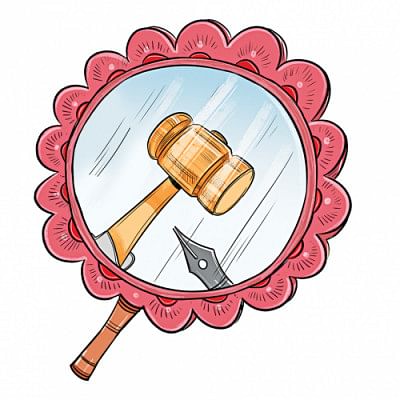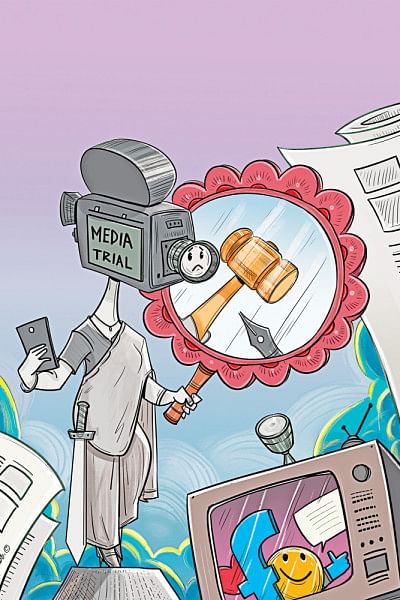Social media trials: Conflicting to the Legal Court Trial?

#Social Issues
Presumed Innocent Until Proven Guilty— this is well-established in criminal law. According to this, the burden of proof lies on the prosecution, which has to invalidate the assumption of innocence against the accused by proving all the elements of offences beyond reasonable doubt. In any case, if it fails to do so, 'the accused or the victim' is acquitted from any further legal trial.
This however, is only the case in a utopian scenario. A usual set-up may depict otherwise, whereas a number of media may be strongly involved, conducting an illegal trial of the accused in the court of public opinion, creating a widespread perception of guilt, even before a verdict has been reached by the court. And things take a tumultuous turn when this tendency is incorporated into the digital space, especially social media, where mob societies are generated, with their own views, ideas, logic and perceptions.
But does the double-edged sword of social media have any credible effect on an ongoing legal trial.
"The swiftness with which any message or news spreads on social media is extremely alarming. Before you know it, an occurrence or the information of a special circumstance is at the fingertips of the masses. This can backfire sometimes, since 'victims-survivors' can suffer from huge psychological impact, and a distraction is created from the real-issue at hand, turning it more into a social, cultural and even moral issue, instead of a legal one. Furthermore, people lack inhibitions on social media, they think they can say anything and everything on the medium," said Kajalie Shehreen Islam, Associate Professor, Department of Mass Communication and Journalism, University of Dhaka.
Mohammad Golam Sarwar, Assistant Professor, Department of Law, University of Dhaka and also the Editor, Law & Rights Desk, The Daily Star, had been slightly apprehensive about the entire subject-matter. According to the veteran educator, media trials cannot influence any trial procedure legally. However, he also informed us that reality was slightly different and we could not ignore the impact of media trials on our justice system, in practice. The professor's view on the ongoing social media trials were varied and informed of a completely different story, altogether.
"Journalists are accountable to a range of Codes of Conduct. They are unable to instigate the regular process of the court. Otherwise, they are regarded as being in 'Contempt of the Court', which is the offense of being disobedient or disrespectful towards a court of law and its officers. There's a multitude of legal doctrines such as the Children's Act 2013 that prevents the identification of any child involved in a trial. There is also the Violence against Women and Children Act 1995 that prevents the publication of the identity of a victim. Instituting a false case in the latter, may cause two years of imprisonment and Tk 1 lakh in fines," said Professor Sarwar.
However, he also agreed that there was no 'Notable Code of Conduct' for the digital space and that definitely prompted people to say whatever they wanted to and felt like.
"Social media is a double-edged sword if I may say, it definitely provides a platform for the voice of the masses, but on the other hand, it cannot stop the process when it goes overboard and misinformation overflows. There's many amongst us who do not know the etiquette of speaking on the digital platform.
"There are however different kinds of laws that may help prohibit unwanted speech or sharing of thoughts and these are the Digital Security Act, The ICT Act and the Pornography Control Act.

The conundrum lies elsewhere— people are frustrated to their core, most of the court cases in our country are pending, because of the lack of 'adequate' evidence. And every day, there are new cases being added to the list. With frustrations reaching their peak and justice being delayed over the years, sometimes people take their frustrations to the digital space, considering it safe. And naturally speaking, judges and police officers are human as well, and sometimes a special case that receives a lot of attention may get a faster verdict because of all the 'attention' it had received in the online space. That is possible, but definitely unfair, to the huge number of pending cases that are yet to see a fruitful ending. In this case, all I would like to say is that social media may seem to be a boon momentarily, but it will definitely pose as a misery in the near future, if it 'cannot be' curtailed in due time and refrained from interfering with the legal system," the professor explained.
The absence of any strict code of conduct allows people on the social media platforms to be largely active in voicing opinions – especially ones that may have an effective role in framing the opinions of others. Ideally, in a democratic society, it is healthy to have a functioning social media for netizens to be able to express opinions freely under the 'Freedom of Speech and Expression' clause.
However, since the term double-edged sword exists to describe the platform, we may as well be a little apprehensive and accept the fact that many of the news 'in social media' maybe be paid, fabricated and false. Furthermore, these 'fictitious' evidences cause defamation to persons who have been acquitted by the courts based on a legal trial and on the grounds of lack of proof beyond reasonable doubt. Because of social media defamation, the accused-victims in these cases, face difficulty in resurrecting their reputation in society, ultimately jeopardising their rights to a dignified life, causing severe psychological and physical harm.
Moiyen Zalal Chowdhury, Assistant Professor of Anthropology at BRAC University and also an avid social media researcher, explained the contradictions, saying, "The most interesting discussion about social media is that it 'should not' be reduced or simplified to the description of 'just an online space to express views,' it is so much more. It is a whole society out there, a hybrid-society, where everyone from a child to a senior citizen is present, connecting, socialising, learning, educating, informing, expressing and so much more."
"We have entered a polymedia environment without any preparations at all. This is very dangerous for both the end user and the state-machinery. There's a lot of discussion on the subject-matter but a reasonable solution could be developing state-level policies to educate people early on, about the etiquettes of using social media. Disseminating information via text books and primary education could be an effective way to reach out to the masses. Then there's the family outlook, where parents should teach their children about the decorum of the online space, since children have been learning to use the smartphone from their toddler years. And the media must also play a huge role in instigating rightful information and only then can we be considered social media savvy and safe to use the platform effectively in order to express our concerns in a positive away, which only helps the society and refrains from hurting the regular judiciary process," Chowdhury said.
It can be said in an idealistic situation, the legal system is expected to consider the people's rights (online and offline) to be informed and be able to cover and disseminate information amongst themselves, while playing a facilitator's role. In a similar situation, it is also expected that the latter would pay due diligence and exert extreme caution in reporting stories, helping to ensure a fair and free trial. Until and unless these positions are reached, the scales will continue to be tilted and social media trials will continue to exist as a unique challenge to the 21st century justice system.
Art: Biplob Chakroborty
Online Resources:
Research Paper by Ms. Somali Chowdhury, Media Trials: Contradiction to Media Ethics?
Research Paper by Barrister Ahmed Ehsanul Kabir, Media Trial: Prejudicing the Rights of the Parties in Criminal Case
Research Paper by Ayush Verma, Social Media Trials: A threat to the society and legal system

 For all latest news, follow The Daily Star's Google News channel.
For all latest news, follow The Daily Star's Google News channel. 



Comments